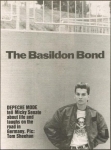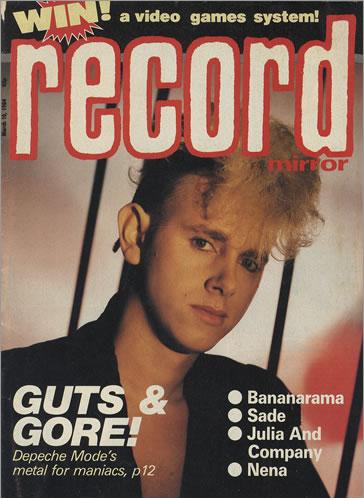Slavery Whip Mix!
1984:January-August
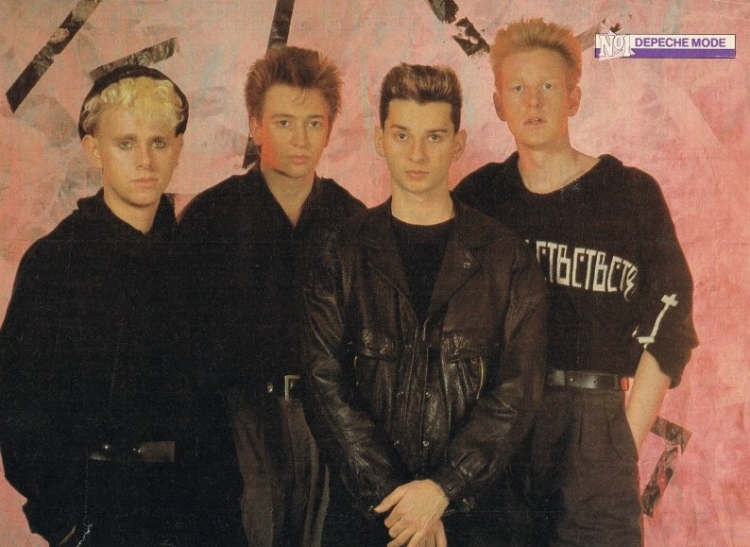
This mini-poster originally appeared in No. 1 magazine
LIVE REVIEW
Oxford Dons
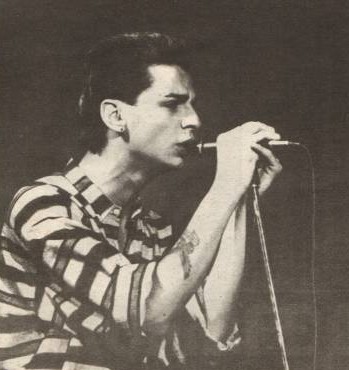
"As the final minutes ticked away before the live "Oxford Road Show" broadcast, Peter Powell concisely shattered a few illusions as he led the audience in several rehearsals of BBC audience hysteria lest the actual arrival of Depeche Mode on stage failed to provide the necessary decibel level (heaven forbid!).
Manfully ignoring the Walkmans being flagrantly waved under his nose, Peter gave us the lowdown on what we had to do in order to appear suitably spontaneous as the cameras rolled, beaming Depeche Mode and the attendant hordes into millions of homes. Gasp! The excitement was almost too much to bear and suddenly we were "on the air", as they say, and Depeche Mode were there, on stage, doing it, large as life and twice as electronic.
In spite of (because of?) the extra lights, and burly cameramen following their every move, the Mode turned into a far more lively and physical performance than usual. David Gahan had obviously spent some time studying Michael Jackson videos, and has adapted at least one of his dance steps. It’s a pity he negated its skill by much flagrant overuse, still I’m all for a little originality – you just can’t Beat It. In contrast, Andy Fletcher and Alan Wilder stood still and concentrated hard, while Martin Gore stared moodily through made-up eyes under his punky barnet.
As the plinks and plonks of "Just Can’t Get Enough" stuttered out of the PA, Gahan continued his solitary crowd rousing tactic, namely raising his arms above his head and yelling "Come on!" until his voice grew hoarse with effort. Never quite sure if the live broadcast had finished or not, the audience responded with unbridled enthusiasm, spurred on, no doubt, by the possibility of waving to the folks at home, as well as maintaining the artificially high atmosphere.
Naturally, any Depeche Mode fan worth his salt would bluster that all Depeche Mode gigs are this exciting, but I doubt that. In spite of occasional sparks of life in the singles charts, Mode remain one-finger merchants, sticking rigidly to the simplistic melody lines of their songs, with nary a hint of a solo to vary the sonorous rhythm of the material. They may be top of their tree, but when you examine the competition, that’s really not saying much.
After an apparent move forward with the excellent "Construction Time Again" album, it’s sad to report that Depeche Mode remain firmly rooted in the stagecraft they’ve used since their inception. A couple of robot lighting towers, a hip swivel here and a hand-clap there do not a decent live gig make. They really can’t rely on chestnuts like "New Life" and "See You" to maintain the excitement level for ever.
Peter Powell reckons Depeche Mode are one of the most underrated live bands around. I reckon Peter is being professionally nice as well as a good crowd pleaser, and Depeche Mode’s average rating is just about right."
Simon Scott
Melody Maker, 11th February, 1984
Note: The date of this performance is unknown.
Reprinted WITHOUT PERMISSION for non-profit use only. Photo by unknown photographer. Reproduced without permission.
ARTICLE
THE BASILDON BOND
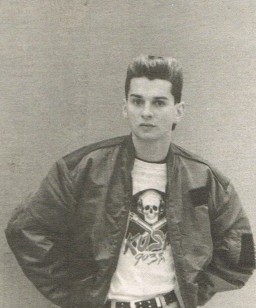
by Micky Senate
Melody Maker, 10th March 1984
_____
DEPECHE MODE tell Micky Senate about life and laughs on the road in Germany
WHEN Depeche Mode last visited Munich, they had to fight their way out of a hotel bar after a drunken Austrian businessman and his pals had taken exception to the group’s haircuts. Just like Basildon all over again!
This time around, the worst they have to endure is a TV lip-synch show on which they are sandwiched between Bette Midler’s "Beast Of Burden" and the duelling guitars of Pink Floyd’s Dave Gilmour and ex-Bad Company personage Mick Ralphs (remember him?). By way of release, Depeche all troll off to the local hop to watch the more inspiring Violent Femmes strut their stuff.
"This is really refreshing," shouts Andy Fletcher, a beer in each fist, as Milwaukee’s second claim to fame set about wiping the floor with rock’s usual rules.
"This lot are about as far away from Depeche as you could get. I think they’re fun. Martin’s really into ‘em… he loves anything that’s in that sort of off-the-wall Jonathan Richman tradition." Sure enough, Martin Gore’s extremely individual tonsure – currently shaved up the sides and exploding in bright yellow curls on top – can be seen bobbing at the stage front.
Depeche Mode are a tough bunch to figure. It doesn’t take much prompting to have them enthuse about the Femmes or Iggy Pop, say, or even the Birthday Party – they mixed "Construction Time Again" in the Berlin studios where the Aussie berzerkers cut the immortal "Bad Seed" – but, discussing their own music, they are painfully reticent and often downright dismissive.
Even the press raves for "Construction Time" have not particularly pleased them. "We’ve still got a long way to go," says Andy, "before people will be proud to have Depeche Mode albums in their collection."
They reject their current categorisation as Socialists as just a convenient journalists’ tag, a distortion. "X Moore claims the last album was virtually a rewrite of the Communist Manifesto. I mean, that’s just silly. The songs aren’t so much political as songs of common sense."
And in case anyone thought a final line had been drawn with the single "Love In Itself" and its apparent rejection of the focus of so much pop, Martin Gore has been busy writing – you guessed it – love songs for the next Depeche Mode record.
"One’s not just a love song," grins Andy, "it’s a real moon-in-June, lovey-dovey…", his voice trails off in mock disgust. "Martin’s in love again, see?"
The composer blushes and giggles. "The point is," he says, "to see something that’s important and to write about it honestly, even if it’s only important to yourself. A love song can be completely throwaway or it can ring true, y’know. Some people tend to think that love songs shouldn’t be treated seriously, that it’s only if you’re writing about social problems that a song becomes serious."
ALTHOUGH Depeche Mode purport to be a band without ambitions ("We never wanted to have a number one or anything, never wanted to break big in America…"), it’s clear that each move they make is carefully weighed and considered. Martin Gore loves spontaneity in other bands, but for Depeche Mode it’s out of the question. This is a group that couldn’t improvise on stage if it wanted to, because its backing tape is exactly the same every night. Small wonder, then, that by the end of a long tour, they often "hate the whole set".
When the cameras close in on Depeche Mode’s German TV slot, an illusion of spontaneity is created at last. Why, here’s Martin putting an electric guitar through some rockist moves. What price techno pop now? And never mind that there is no guitar on the track they’re miming!
"Well, there is a ‘sample guitar’," Martin says in justification, explaining that producer Daniel Miller had programmed the guitar part on the Synclavier in the studio.
"I was sort of pressured into using the guitar for this show," Martin continues, "but I’m not entirely happy with the idea. I can see the argument that people are maybe a bit bored watching Depeche Mode prancing around three synthesizers, but on the other hand I wouldn’t like us to wind up looking like every other rock band. That’s the trend at the moment, isn’t it? The Human League are playing guitars now. Most modern electronic bands seem to turn to guitars in the end."
Not that this electronic band’s career needs much cosmetic retouching in Germany where "Construction Time Again" has really been the album to establish them. It is still wedged firmly in the best seller lists.
"It’s pleasing that we’ve finally had a hit somewhere apart from England," says Andy. "But it’s hard to understand why. After the album had done really well here, we put out ‘Love In Itself’ as a single and it bombed. We can’t work that out. It may be that the success is just a freak thing; maybe it’ll never happen again."
Martin: "When Daniel first read the lyrics of the album, he said, ‘Oh yeah, this’ll go down all right with the Green Party.’ Can’t imagine it myself. If they’ve been buying the record, they certainly haven’t been at the concerts…"
A suggestion that Depeche remove themselves to the European Continent on a permanent basis to capitalise on their new popularity is waved away…
"No, it’s true that Basildon is not the centre of the world, but when you’ve lived there all your life, it’s hard to make the move. All our friends are there. Vince Clarke, right, he moved to Walton-on-Thames, and even that was too far away. He’s thinking of coming back to Basildon."
TOURS, viewed as a mixed blessing – "a good time is had by all, apart from us" – do at least have the function of getting the band out of Essex. Depeche Mode are currently en route for Spain and Italy. They’ll be back in May to record the follow-up album to "Construction Time" which should, all things being equal, be out in September. In October, they’ll tour Britain and in November revisit Germany. After which they’ll probably have another stab at the States.
"And no doubt," says Martin, smiling, "we’ll repeat the entire schedule in 1985".
Andy grimaces. "It’s not always as boring as it sounds."
Reprinted WITHOUT PERMISSION for non-profit use only. Photo by Tom Sheehan. Reproduced without permission.
SINGLE REVIEWS
PEOPLE ARE PEOPLE - released March 12, 1984
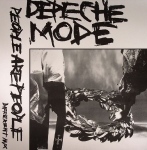
"This time they’ve gone all radical with a distinctly metallic sound. But instead of jarring the nerves it tends to induce movement in bodies that normally wouldn’t be seen dead on a dancefloor. The lyrics are good too – about "getting along awfully" and not understanding hate. Makes a change from all this unrequited love business. Easily their best yet and this harder direction is bound to spawn bags of imitators."
Peter Martin
Smash Hits, 15th-28th March, 1984Reprinted WITHOUT PERMISSION for non-profit use only.
"Depeche Mode singles are often their own worst enemies.
On first hearing, their simple synthesised tunes and Dave Gahan's stiff-necked vocals can seem plain and familiar. It's only after a few plays that the subtle melodies and rhythms begin to come through.
'People Are People' is not as cynical as 'Everything Counts', but it's just as worldly-wise - the killer being the sub-chorus: "I can't understand ..."
A good one for the next time we take to the terraces in Paris."
Unknown reviewer
No 1, March 1984Reprinted WITHOUT PERMISSION for non-profit use only.
"Another plea to the world along the lines of Timmy Thomas' 'Why Can't We Live Together?', which compensates with sincerity what it lacks in verbal grace. With the now customary electro-physical jerks ensuring you're never lulled into ear-candy complacency by its deft tunesmithery and vocal harmonies, 'People Are People' marks time before Depeche Mode's next Great Leap Forward."
Unknown reviewer
New Musical Express, March 1984Reprinted WITHOUT PERMISSION for non-profit use only.
RELATED ITEM: Are These Men Really Miserable?
ARTICLE
Clunk Clunk Every Trip
by Jim Reid
Record Mirror, 10th March 1984
_____
Depeche Mode's sugar 'n' spice image has taken a real knocking recently. First they lay the ghost of synthipop confection, with a mature, not to say serious LP, "Construction Time Again", then they razor up chart respectability with a crucial piece of metal pop, their new single "People Are People". And in the process of making said gem they nearly come to blows in the studio...
"...Daniel (co-producer and Mute supremo Daniel Miller) and Andy nearly came to blows when we were doing the single," says Martin.
"It weren't actually blows," corrects Andy. "It was more sorta argy bargy. A stupid thing late at night - I was near his flight case..."
"Andy and I were mucking about," continues Mart. "Trying out self defence on each other, near Daniel's equipment. Daniel came out and he was furious. He wasn't very pleased at all..."
Depeche Mode are no longer smooooth operators. The group have turned one of pop's familiar processes on its head. Starting from an extremely commercial standpoint, they've gradually added muscle and variety to their new town pop and lifted their vision away from traditional pop song formats to larger issues. They've opened their eyes, and opened their minds.
Thus Mode make an accessible item of metal pop - "People Are People" - and make a strong anti-racist statement to boot.
"Although it's a song about racism," says chief songwriter Martin Gore, "that's just one example of people not getting on. It's about all sorts of differences between people."
"You could interpret it as being anti-war as well," says Alan.
Racism, the iron grip of capitalism ("Everything Counts"), and conservation ("The Landscape is Changing") - it's a long way from silly love songs and the colour of Dave Gahan's socks. Are Dep Mode becoming serious young men?
"I don't think so," says Martin. "When people say you're a serious band they think you don't have a good time anymore - you walk around all the time with your cheeks sucked in, things like that. But we don't. We're still exactly the same. It's just the things we're writing about and the way we want to come across in interviews that has changed."
You're more thoughtful then?
"I think so," says Mart. "When we first started we just did anything that came along, basically. If someone came along with a video script, the first one we saw, we'd jump at it."
So you did things you regretted?
"Most of the videos for a start," continues Martin. "I'm not happy with any of them apart from the last two. For instance, "See You" and "The Meaning Of Love" were really, really sickly. I know at the time our music was a little bit like that anyway, but I think we were doing it more tongue in cheek and that never came across in the videos."
Consequently, Dep Mode are a more considered bunch these days. I mean, after three years in the top 20 they're virtually the old men of pop.
"It's unbelievable to think we've had 10 singles out," says Martin. "I think the time has gone so quickly that we don't think about it all that much. We've had three albums out but it seems that we've only been in the business for about a year."
Yet, whilst others have fallen on pop's transient way, Dep Mode have gone from strength to strength. What's their secret?
"A lot of time bands are not allowed to develop," says Andy. "Record companies take them on just on the strength of one single. Perhaps after they've had a coupla flops they are off the label. Our advantage is that we're on a small label. We're given time to think things out and take things at our own pace."
Presumably this situation is further cemented by Mode's close working relationship with Mute boss Daniel Miller?
"We work very closely with Daniel," says Alan. "He likes to be involved in everything we do in some way - he likes to have his say. Depeche Mode is a very personal thing to him. It's a great working relationship with Daniel. There's no ulterior motive with him, you know he just wants what's best for the group. In that way it's very easy for us to talk to Daniel about everything we want to do and see what his opinion is."
And yet at the end of the day, it's Mode's ability to adapt, experiment and change, that has kept them at the top. Using M Gore's popwise melodies as a base, they've continued to explore the possibilities of the most modern studio techniques.
"It's where interest in music in the future lies," opines Martin. "As technology improves all the time that's gotta be where the most interesting form of music comes from. You can't stick with the same format all the time, if you wanna keep coming up with interesting material."
Fair enough, but isn't 'metal' a return to the past?
"We made a conscious decision to become harder musically," informs Alan. "So we thought, 'what sounds really hard and nasty?' - and of course we decided on metal. It's no big theory or anything."
So what instruments did you use on the single?
"All kinds really," continues Mr Wilder. "It's mainly 'sample' stuff, y'know, real sounds being sampled, rather than being played on instruments."
Martin takes the reins: "All kinds of metal sounds, I know that sounds bad, but it was more subtle than people might think. For instance the bass drum was a normal bass drum with the initial click of a piece of metal being hit to give it more attack. Then there were bell sounds and less hard metal sounds.
"Yet we didn't use just metal sounds on the single, we used all kinds of sounds and noises, like an acoustic guitar 'sampled' and played on the keyboards."
Sounds a bit complicated to me. Are you all techno boffins then?
"Well we're good at computer games," says Alan. "But we're not really technologically minded at all. We don't even understand how the keyboards work.
"Daniel's the one who's operating the Synclavier for us at the moment," says Martin. "Maybe in a year we'll be able to take over, the manual's very thick and it'd take us ages to work out how to use the thing. At the moment he just puts our ideas on it for us."
And at the moment what are those ideas working towards?
"We're just writing with the view of recording an LP in May," says Alan. "I suppose we'll spend about three months doing that, then we'll come full circle and go back to touring again. We're slightly in that rut - we're following the same pattern as we did last year."
So why don't you write music for something other than pop records - film tracks perhaps?
"We were offered a film, but they wanted songs as opposed to music," says Alan. "When you're at the level we are it's very difficult to find time for other projects, 'cos they're very time consuming.
"All the time we're trying to establish ourselves, because we're not hugely successful. It's worrying that if we took a year off, we'd come back and nobody would remember us."
And so until Dep Mode establish themselves with the performance and credibility they surely deserve, we can still expect to see them being jolly fellows on Saturday morning TV.
"It'd be nice not to have to do that sort of thing," says Martin. "Most of the time it is very embarrassing."
"We're in a bit of a dilemma," concludes Andy. "'Cos we do like to sell records - so we do have to go through with all of that. As long as we come across well, I don't think it matters."
Reprinted WITHOUT PERMISSION for non-profit use only.
ARTICLE
YEAH,YEAH HE'S A MODE
Interview with Dave Gahan
By George Kay
Rip It Up, July 1984
_____
Depeche Mode, one-time Basildon pop pixies fronted by Vince Clarke, have been searching for credibility, a music that will last. And being a synth band this search is going to be hard work with acceptance even harder.
DM's Dave Gahan sounds just like any other cockney on the phone - cheerful, hopeful and quite confident that the band is progressing and taking its audience with it.
Last year's concussive Construction Time Again was a departure from the candyfloss blows of Speak and Spell and Broken Fame [sic]. Did the band find it difficult to break out of the wimpy synth stereotype?
"No, because the label we're on, Mute Records, allowed us a lot of freedom to develop over the four years we've been together, and now we're starting to reach the point in production and general recording techniques where we're a lot better. So now we know how to make a record and sound good. It's all about learning."
Has the band felt that there's been a backlash against the feel of synthesisers in favour of more human instruments like guitars?
"A lot of people feel that but I don't agree there's been a backlash because if you listen to every pop record these days these's at least a few synthesisers in there and even a Linn drum. People are getting into the technology and it's making music a lot more accessible because young groups don't have to be so technically good as musicians to put their ideas across on computers or synthesisers. I think that's very healthy.
"But then again we've crossed that phase as our records sound very human unlike the records of someone like Gary Numan. The synthesiser is a very good instrument and you can use it the way we do and create good pop songs."
Looking at Depeche Mode's three albums it would be easy to argue the case that they're primarily a singles band who lack the staying power and emotional depth to make a satisfying long player. 'Just Can't Get Enough', 'Leave In Silence', 'The Meaning of Love', 'Get The Balance Right', 'Everything Counts' and now 'People Are People' are the real signs of their development.
In fact Yazoo's Alison Moyet said in these very pages a couple of years ago that the only song she liked by Depeche Mode at the time was 'Leave In Silence'. Comments?
"Well, at that time we weren't thinking about what we'd been doing. When we started recording 'Leave In Silence' we felt strong about it because it was a better style and we wanted to do something different and it was a very good song with plenty of atmosphere."
It was also a Martin Gore song, post Vince Clarke. Is it possible that if Clarke stayed with the band that he could have been a barrier to progress?
"Yeah, that may be true as Martin was just waiting to come out of his shell and he's come on so much and now he's a very good songwriter. When Vince left it gave us a good kick up the arse but it was the best time for him to leave as Martin had some good songs. When 'See You' became a big hit we gained even more confidence and it helped establish us."
Is commercial success important?
"Yeah, it is a worry and it's difficult but you have to develop first and from there hits are a plus. We're developing all the time, we're not trying to make another hit."
Are Depeche Mode reluctant pop stars?
"The pop star thing is just a name you get tagged with because of commercial success but basically we haven't changed as people, we're just wiser to the music business."
Depeche Mode's new single 'People Are People' is perhaps the strongest they've come up with. The twelve inch format almost buries the song with its percussive synthesiser thwack but the chorus refrain of 'I just can't understand/What makes a man/Hate another man/Help me understand' [sic] is one of the most moving insights you'll hear for a while.
"Martin's lyrics have really come on and he feels really concerned about things, like he's not into violence. But he's also a very private person and he doesn't like to talk about it.
"With 'People Are People' we had the same excitement in the studio as we had with 'Everything Counts' because we knew it was such a good song. And the sleeve is also important as it's a strong symbol showing a soldier and a priest and that those two people could meet together despite the fact that they are opposites."
At the time of this interview the band is in the process of recording their fourth album. Is there an awareness of making the music too overtly political, a feature that was too apparent in Construction Time Again?
"Yeah, very much and that's why the new album isn't going to be dealing with socialist and political things. There'll be some love songs and some on general topics other than social. What we've recorded so far is very good. We can't afford to rest on the success of the last record."
Reprinted WITHOUT PERMISSION for non-profit use only.
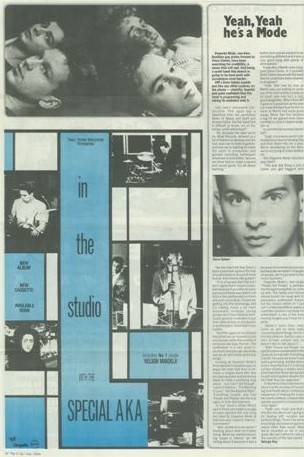
ARTICLE
CONSTRUCTION TIME AGAIN

by Tim de Lisle
Smash Hits, 16th August 1984
_____
Depeche Mode are recording in Berlin. It's a long and rather strange process that involves computers, "sampling", video games, mineral water, toy instruments and several kinds of muesli. Tim de Lisle pretends he understands it all anyway.
If you wanted to give your grandmother a nice holiday, you wouldn’t send her to Berlin.
The West side is dirty, noisy, sleazy and overrun by teenagers – the girls all look like Nena and the boys all look like the boys in her band. The East side is clean, silent, prim and drab, and the Wall between the two sides is horrible, a constant reminder of what’s wrong with the world.
But then your grandmother isn’t – or I assume she isn’t – a pop star. In the eight years since David Bowie, Brian Eno and Iggy Pop worked together in Berlin everyone from David Sylvian to Killing Joke has followed them across Northern Europe. The studio that they all use is the Hansa Tonstudio, set in a typically post-nuclear Berlin landscape and well within firing distance of the East German soldiers on the Wall. This is where Depeche Mode have come to mix their fourth album, though the only things being mixed when Mike Putland and I arrived one lunchtime were several kinds of muesli – breakfast for Daniel Miller, the band’s manager, producer and record company boss.
The band turn up soon afterwards, Martin Gore from the flat he shares with his German girlfriend, the others from the Hotel Intercontinental. They sit around the mixing desk, drinking coffee, talking hard and cracking jokes. The first thing Andy Fletcher says to me is "What happened in the test match?" Like many cricket fans, he’s fond of facts and figures: when the conversation turns to Frankie Goes To Hollywood the only thing he has against them is that they look like equalling Gerry And The Pacemakers’ feat of going to Number One with their first three singles.
This is Depeche Mode’s eleventh day in Berlin – before that they did two months’ recording in North London – and, like the first ten, it’ll be spent mixing the new single "Master & Servant". The 7" version is complete and, for my benefit, they play it through the studio’s biggest speakers. They’re slightly smaller than the doors and could probably make "The Smurf Song" sound impressive. "Master & Servant" sounds wonderful but it’s hard to imagine how it would come across on the radio. "All right," Dave Gahan says, "we’ll put it through small speakers." It still sounds wonderful.
The plan is to finish the 12" today, which means adding two minutes or so to the seven they’ve already got. The sounds are all laid down on tape: it’s just a matter of putting them down in the best possible order – like doing a jigsaw puzzle when the pieces fit a thousand different ways. This would be complicated for one person: for six (the band, Daniel, and Gareth Jones the engineer and co-producer) it’s tortuous. Gareth looks like a computer programmer in his grey suit, white shirt and stripey tie, and that’s more or less what he is. Most of the noises on the single have been put through a computer and on the mixing desk there are two video screens as well as 2000 switches.
Over lunch in the studio restaurant I ask Martin if making a record now has more to do with technology than music.
"Not really, ‘cause all the songs are written before we get into the studio, and we demo everything before we sample the sounds."
Sampling, he explains, means feeding non-musical noises into something called a Synclavier, which "sequences" them i.e. turns them into musical noises.
"We’ve used quite a lot of toy instruments. Me and Andy went to Hamleys and bought nearly everything in the musical department – xylophones, toy pianos, toy saxophones."
So how much do they use conventional instruments?
"Less and less. We’re up to at least 50% sampled sounds now, maybe 60%."
Is the single typical of the new LP?
"Typical of some of the songs," says Martin, who writes them. "But I think there’s quite a cross-section. We tried to get away from the kind of theme we had running through the last album. Some of the songs, the new single for instance, could be called an extension of that, whereas some are different – there’s a couple of love songs, which we’re bound to be slagged for, but I think they’re more honest than the earlier ones – things like "See You" were very concocted love songs. The new album is very sincere!"
Do they have any ambitions left?
"We never really had ambitions," Andy says. "It’s never been our ambition to be Number One, say, ‘cause we feel we’d never get to Number One anyway. Too many people hate us."
Who are their fans now? "It’s about 50-50 girls and boys," Andy says, "and they’re mainly 16-20 now. It used to be mainly girls, and mainly younger than that. We don’t get them screaming any more – we’re not that good-looking, are we? Not exactly pin-ups!"
After a quick go on the video game in the restaurant – Martin and Andy are addicts and Martin announces that he’s the "seventh best player in the world" – it’s back upstairs for another eight hours’ work on the "Master & Servant" 12". For everyone except Gareth this means sitting and thinking rather than doing anything, but it’s hard work nonetheless. Snatches of the track are played over and over again.
Fortified with coffee, mineral water and a copy of Smash Hits (they were delighted with the letter from Tony Shaw of Derby who called himself "Probably Their Greatest Fan Of All Time") they eventually complete the job at 12:30am. The lights are turned down, the volume right up, and the 12" is played straight through twice to the tapping of toes and the nodding of heads.
They’re pleased with it. And rightly so.
Reprinted WITHOUT PERMISSION for non-profit use only. Photo reproduced without permission.
SEE ALSO: Sampling Mode
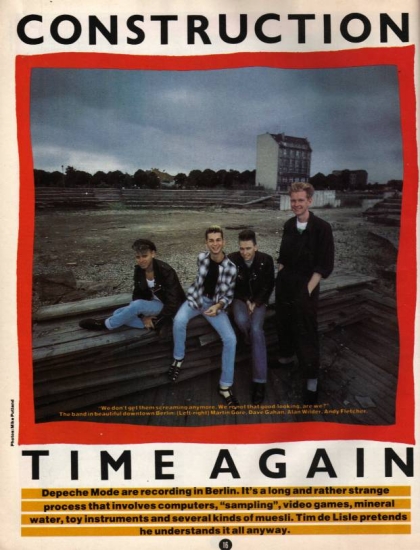
SINGLE REVIEWS
MASTER AND SERVANT - August 20, 1984
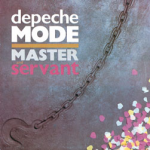
"What do you expect from this lame bunch of dickheads?"
Dave Walters
Time Out, 30th August, 1984
"Very reminiscent of The Royal Guardsman's ancient hit 'Snoopy Versus The Red Baron. I'm afraid that, except for the lovely "See You", Depeche Mode have consistently failed to evoke any melancholy in me."
Robert Hodgens (The Bluebells)
Smash Hits, 30th August, 1984
"Depeche Mode have made some unexpectedly tough records in the last year or so but 'Master and Servant' sees their simple formula reduced to drivel.
The beat's still there but when you've got Dave Gahan pretending to be whipped you know it's time to buy a new Frankie re-mix."
Paul Simper
No. 1, 25th August, 1984Reprinted WITHOUT PERMISSION for non-profit use only.
SEE ALSO: Martin Gore: Me And My Leather
